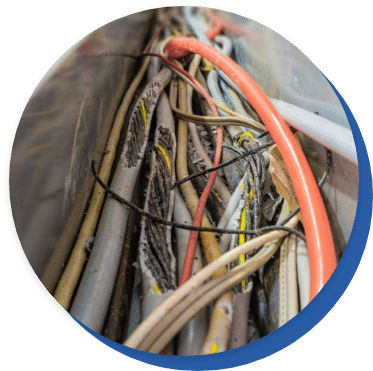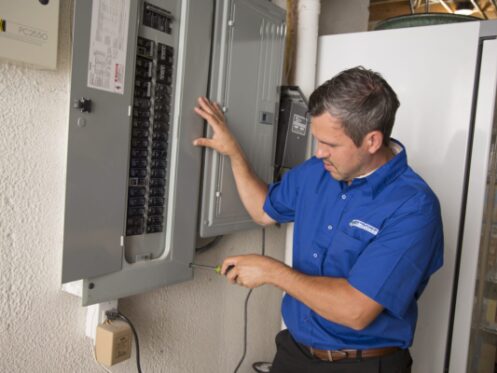Most homeowners have experienced a power outage before, but do you know what actually causes them? It’s not always just a lightning bolt! Likewise, did you know that there are ways to prevent certain outages and keep you and your home safe in the event of an outage? There are! Let’s talk about the different types of power outages, what causes a power outage in your home, and what you should do in the event you do lose power in your home.
Causes of Grid Outages
First, let’s take a look at grid outages. A grid outage occurs when the infrastructure that delivers electricity from power plants to homes and businesses (via utility companies and suppliers) either fails or simply doesn’t have enough electricity to meet demand. While the latter doesn’t happen often, the former certainly does – and for a wide range of reasons
- Weather: responsible for over 80% of all major outages. Storms, high winds, snow, and rain account for the majority of grid outages in the United States.
- Downed trees or limbs: From touching power lines to falling on top of electrical equipment, trees are a common cause of power outages.
- Animals:Animals climbing or landing can short electrical equipment or cause arcing, fires, and other issues resulting in outages.
- Supply shortages:
- Planned outages and safety shutoffs:
Grid outages will affect an entire area connected to the grid, whereas a power outage that only affects your home is different. How do you tell if the issue is occurring on the grid, or in your home?
How To Tell if it’s a Grid Failure, or a Problem in Your Home
When you lose power in your home, you might automatically assume it’s a grid-wide power outage. Other homeowners might think it’s just in their home. How can you tell? One of the first and simplest ways to determine if the power outage is just within your home is to go outside! Look at other homes and streetlights. If you see other homes with lights and electronics turned on or street lights working, it’s probably just in your home. This will be easier to accomplish at night, of course. Another thing to check is your utility company’s website or to call their customer support number to check if they have announced any planned or unplanned outages in your area. Also, be sure you’ve paid your electrical bill!
If there appears to be power on your street but not in your home, and your electrical provider hasn’t announced any problems, the problem is likely to be in your home. The first step you should take is to investigate the most common culprit: your electrical panel! If the power is out in only part of your home, it’s likely that a breaker has flipped due to overload or a wiring issue and needs to be reset. If you have power loss in your entire home, you could try resetting the main circuit to see if power is restored.
Causes of an Outage in Your Home
If you’ve confirmed it’s not a grid outage and that the problem is isolated to just your home, there a few reasons why you might have lost power. We’ve compiled a list of the most common culprits!
Blown Fuses
Newer homes will have circuit breakers, but if your electrical panel is older, it likely uses fuses. Both perform the same function: to protect your electrical system from overloading and short-circuiting. This can happen for a number of reasons. Damaged wiring or excess moisture can cause a short circuit. Damaged electrical outlets can also cause a blown fuse when you try to use an appliance. Perhaps most common of all, however, is an overload of the circuit or fuse. This occurs when there is more demand for electricity than the circuit can provide. If you have an older home or outdated panel and you’re adding more and more electrical devices and appliances into your home, this is a common problem. A blown fuse or electrical panel issues can be dangerous, so if you aren’t sure what you’re doing – always consult a professional electrician for repair.
Electrical Panel Failures
Your electrical panel is what connects your main power line to the various circuits throughout your home. That’s why in some cases, you might experience power loss only to a certain room or area of your home – a fuse or breaker has blown or flipped because of an issue with that specific circuit. If you’re experiencing frequent flipped breakers or your home still uses an outdated fuse box, it’s a good idea to contact an electrician to consult about electrical panel replacement.
Damaged Power Lines
Power lines are part of the electrical grid, and carry electricity to different endpoints on the grid (i.e. your home). Something as simple as a broken tree limb damaging a power line can cause a loss of power in a small area, such as just your street. It may not be a full power outage in your are, but rather just your home and perhaps the block you’re living on.

Power Surges
A power surge is exactly what it sounds like! It’s when too much power is being transmitted through wiring or electrical devices. Power surges can happen for a number of reasons. The most common by far are overload, faulty wiring and lightning strikes, but there are other times when they can occur as well. Overloading can happen if you have way too many devices and appliances plugged into a circuit, and it can’t handle the amount of power being drawn.
Power surges can cause significant damage to electrical equipment and devices such as computers, televisions, and even large appliances. They can also be a fire hazard. To help protect your home and electrical devices from the dangers of a power surge, you’ll want to do two main things. The first is to ensure your wiring isn’t faulty and that your electrical panel can meet the electrical needs of your home. The second is to add a whole-home surge protector. These devices protect your entire electrical system from power surges, unlike those point-of-use power strips you likely have laying around.
Water Damage
It might go without saying, but we’ll say it anyways: water and electricity mix too well! Water is an excellent conductor of electricity, and that doesn’t mean it’s a good thing. If water or excess moisture find their way into your writing, outlets, or anything else electrical – that’s going to cause a problem. Make sure that water doesn’t have the opportunity to get anywhere near your electrical devices or outlets. If it does, you’ll want to cut power by flipping the main breaker to your home. Be sure to have a flashlight or light source handy when you do this – don’t leave yourself in the dark!
Sometimes, leaks or plumbing emergencies such as a burst pipe can make the risk of water damage to your electrical system more immediate. Be sure to get in touch with a plumber to resolve these issues right away. Contacting an electrician afterwards to inspect your electrical system is a good idea, too, if you suspect any water or moisture might have found its way where it shouldn’t.
What To Do When the Power Goes Out
In the event of a power outage, it’s certainly important to determine what the cause of the problem is. Knowing if it’s simply a planned outage from your electrical provider or if there’s an issue with your home is important. Regardless of where the issue stems from, though, there are some important safety measures that you can take that are both preventative and proactive!
Have A Plan!
While no one wants to anticipate a power outage, it’s good for every homeowner to have a plan of action in place just in case.
Steps to take during a power outage
- Confirm the power is out. Check your electrical panel for any flipped breakers or blown fuses, and check with your electrical provider to see if there is an outage in your area. Report the outage to your electrical provider.
- Turn off and/or unplug electrical devices and appliances to avoid potential surge complications when power is restored.
- Have flashlights and candles (or other lighting sources that don’t need your electrical system) handy for safety and visibility.
- Keep your refrigerator and freezer closed to preserve internal temperatures.
- Having some handy blankets in the winter or opening windows in the summer can help with temperatures. However, if your home is insulated, keeping doors and windows closed will help trap any cold or hot air in your home for a while.
- Invest in a backup generator to ensure you have power in the event of an outage. This can power all of your electrical devices (HVAC system, security system, medical devices, etc) in the event of an outage – a no-brainer!
Having a plan for a power outage is the best thing you can do to ensure you and your family are safe if power is lost. Remember, preventative measures are always better than trying to figure things out afterwards! If your home was built more than 10 or 20 years ago, it’s probably a good idea to consult with a trusted, professional electrician to inspect your home’s wiring and panel as well as your current electrical needs. In Farmington Hills, IN, and the surrounding areas, that’s AJ Danboise Plumbing, Heating, Cooling & Electrical!

